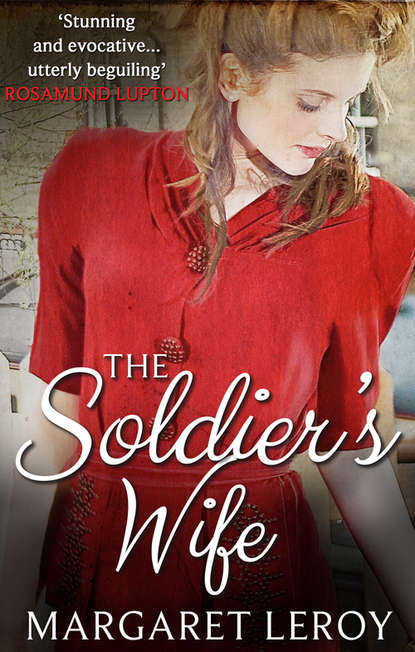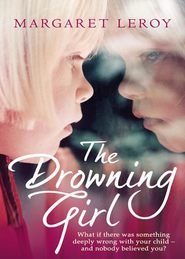По всем вопросам обращайтесь на: info@litportal.ru
(©) 2003-2024.
✖
The Soldier’s Wife
Настройки чтения
Размер шрифта
Высота строк
Поля
I stand there, shaking. Someone drags me under a table. We are all under the tables now—the elderly couple, Mrs du Barry, the mother clutching her child. Someone is saying Oh God oh God oh God. There’s a shattering sound as the window blows in, shards of glass all around us in a dangerous, glittering shower. Somebody screams: it might be me, I don’t know. We crouch there, wait for the end, for the bomb that will surely land on us.
Suddenly, amid the clamour, the air-raid siren goes off.
‘About time,’ mutters Mrs du Barry beside me. ‘About bloody time.’ I hear the sob in her voice. Her fingers dig into my arm.
The elderly woman is gasping now, as though she has no breath, her husband holding her helplessly, like someone holding onto water, as though she might slip from his grasp. The young mother presses her baby tight to her chest. The sounds from the harbour assault us, the boom and crash of falling bombs, the growl and scream of plane engines, the terrible rattle of guns. More windows shatter around us. It goes on and on, it seems to last for ever, an eternity of noise and splintering glass and fear.
And then at last the sound of the planes seems to fade, receding from us. I find that I am counting, like you do in a storm—waiting for the thunderclap: expecting them to circle back, more bombs to fall. But there’s nothing.
A silence spreads around us. The tiniest sound is suddenly loud. I hear a splash of tea that spills from a table onto the floor: there’s nothing but the drip drip of tea and the pounding of blood in my ears. Within the silence, the baby starts wailing, as though this sudden stillness appals him more than the noise.
I look down, see that a piece of glass is stuck in my hand. I pull it out. My blood flows freely. I don’t feel any pain.
I crawl out from under the table, leaving the other people. Not thinking at all, just moving. I get to my feet and run out of the door and down the High Street and through the arch to the covered steps that take you down to the pier. The steps are dark and smell of fish and the damp stone is slippery under my feet. I have only one thought—to look for Gwen, to see if Gwen is alive.
At the bottom of the steps I come out into sunlight again, on the Esplanade that runs along the harbour past the pier. All the horror of it slams into me. Everything is on fire before me, I can feel the heat of it here, but the fire seems unreal, as though it couldn’t burn me. There are bodies everywhere, lying strangely, arms and legs reaching out, as though they were flung from a great height. The lorries are all burning. Tomato juice and blood run together over the stones, and there is grey smoke everywhere—smoke from the fires, and a smoke of dust—and smells of burning and blood, and a terrible rich charred smell that I know must be burning flesh. The body of a man has dropped out of the cab of his flaming lorry—it’s an ugly, broken, blackened thing. I hear a cry, and it chills me—it’s like an animal blind with anguish, not a human sound. I rub my eyes, which are stinging, as though the sight of the fire is hurting them. Everything is so bright, too bright—the red, the flames, the blood that streams on the stones.
I look up and down the Esplanade, but I can’t see Gwen, I don’t think Gwen can have been here. I’m praying she got away in time. I walk out onto the pier. Heat sears at my skin as I pass a smouldering lorry. My foot slips in a pool of blood. I have some vague thought that perhaps I could help—I can do a splint, a neat bandage, I know a little First Aid. Yet even as I think this, I know how pointless, how useless, it is—that everything here is utterly beyond me.
I come to a man who is lying on the pier beside his lorry. His face is turned away, but something draws my eye—the check cloth cap on the ground beside him. There’s some significance to this, but my thoughts are so heavy and slow.
‘Oh God,’ I say then, out loud. ‘Frank. Oh God.’
It’s Frank le Brocq.
I kneel beside him. I can see his face now. At first I think he must be dead already. But then his eyelids flicker. I cradle his head in my hands.
‘Frank. It’s Vivienne. Frank, it’s all right, I’m here …’
But I know it is not all right. The one thing I know is that he cannot live with such wounds—the blood that seeps from the side of his head, the blood that slides out of his mouth. I feel a heavy, passive helplessness: so any gesture, any word, takes all the strength I have.
He’s trying to speak. I put my ear close to his mouth.
‘Bastards,’ he whispers. ‘Fucking bastards.’
I kneel there, holding him.
I try to say the Lord’s Prayer. It’s all I can think of. My mouth is stiff and I’m afraid that I won’t remember the words. But before I get to the power and the glory he is dead. I carry on anyway. For ever and ever. Amen.
He’s staring at me with empty eyes. I reach out and close his eyelids. Then I just kneel there beside him. I don’t know what to do now.
A shadow falls across me; someone is bending down to me. I look up—it’s a fireman. Behind him, I see the single fire engine that’s come.
‘Excuse me,’ I say. ‘I know you’re terribly busy, but this man—he’s a friend of mine, Frank le Brocq …’
The fireman’s face is white but composed. He peers down.
‘I know Frank,’ he says.
‘The thing is—he’s dead, you see,’ I say.
‘Poor, poor bugger,’ says the man. ‘You knew him, did you? You knew Frank?’
‘Yes.’ My voice rather cheerful and brittle and high. ‘Well, I know his wife better, really. Angie le Brocq. I was up at Les Ruettes just a few days ago. They were going to take in my mother-in-law, if we had gone on the boat … But then we didn’t go of course …’
The words tumbling out of me. This has nothing to do with what’s happening, but somehow I can’t stop talking.
The man looks at me in a worried way. He puts his hand on my shoulder.
‘Look, ma’am, you need to go home. You should go and get yourself some rest. Go home and make yourself a cup of sugary tea …’
‘But I can’t just leave him here like this …’
‘There’s nothing you can do,’ he says. ‘Someone will see to him later.’
I feel he’s being obtuse.
‘No, you don’t understand. I know Frank. I can’t leave him lying here. Look at him. It’s so awful …’
He gives me a hand and pulls me up. The effort of standing stops the stream of talk from my mouth. I’m shaking so hard I can scarcely stand.
He gives my arm a wary pat, as though I’m some skittery wild animal that he is trying to soothe.
‘I mean it, ma’am. You should just take yourself off home now,’ he tells me.
I ring Elm Tree Farm from the first public phone box I pass.
Gwen answers.
‘Oh, Gwen. Thank God … I wondered …’
‘I’m all right, Viv,’ she tells me. ‘I got away in time. I’m so glad to hear your voice. I’ve been sick with worry about you …’ Then, when I don’t say anything, ‘Viv—are you sure you’re all right?’
I can’t answer her question: my mouth won’t seem to work properly.
‘Gwen—I can’t talk now. I have to get back to the girls. But I’m not hurt—don’t worry.’
I put down the phone.
When I arrive back at Le Colombier, Blanche’s face is at the window. She sees me and runs to the door.
‘Mum. What happened?’
Her voice is shrill, her eyes are wide and afraid.
‘They bombed the harbour,’ I tell her.
‘We heard the planes.’ she says, in a little scared voice. ‘Mum. We thought you were dead.’









